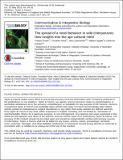Files in this item
The spread of a novel behaviour in wild chimpanzees : new insights into the ape cultural mind
Item metadata
| dc.contributor.author | Gruber, Thibaud | |
| dc.contributor.author | Poisot, Timothée | |
| dc.contributor.author | Zuberbuehler, Klaus | |
| dc.contributor.author | Hoppitt, William | |
| dc.contributor.author | Hobaiter, Cat | |
| dc.date.accessioned | 2015-05-20T12:01:01Z | |
| dc.date.available | 2015-05-20T12:01:01Z | |
| dc.date.issued | 2015-05 | |
| dc.identifier | 180145938 | |
| dc.identifier | 63dcce43-da24-4573-a7ad-b0c8b6fc0673 | |
| dc.identifier | 84951300675 | |
| dc.identifier.citation | Gruber , T , Poisot , T , Zuberbuehler , K , Hoppitt , W & Hobaiter , C 2015 , ' The spread of a novel behaviour in wild chimpanzees : new insights into the ape cultural mind ' , Communicative and Integrative Biology , vol. 8 , no. 2 , e1017164 . https://doi.org/10.1080/19420889.2015.1017164 | en |
| dc.identifier.issn | 1942-0889 | |
| dc.identifier.other | ORCID: /0000-0002-3893-0524/work/46125086 | |
| dc.identifier.other | ORCID: /0000-0001-8378-088X/work/64360739 | |
| dc.identifier.uri | https://hdl.handle.net/10023/6673 | |
| dc.description | TP was funded by the Canadian Research Chair in Continental Ecosystem Ecology, and received computational support from the Theoretical Ecosystem Ecology group at UQAR. The research leading to these results has received funding from the People Programme (Marie Curie Actions) and from the European Research Council under the European Union's Seventh Framework Programme (FP7/2007–2013) REA grant agreement n°329197 awarded to TG, ERC grant agreement n° 283871 awarded to KZ. WH was funded by a BBSRC grant (BB/I007997/1). | en |
| dc.description.abstract | For years, the animal culture debate has been dominated by the puzzling absence of direct evidence for social transmission of behavioural innovations in the flagship species of animal culture, the common chimpanzee. Although social learning of novel behaviours has been documented in captivity, critics argue that these findings lack ecological validity and therefore may not be relevant for understanding the evolution of culture. For the wild, it is possible that group-specific behavioural differences emerge because group members respond individually to unspecified environmental differences, rather than learning from each other. In a recent paper, we used social network analyses in wild chimpanzees (Pan troglodytes schweinfurthii) to provide direct evidence for social transmission of a behavioural innovation, moss-sponging, to extract water from a tree hole. Here, we discuss the implications of our findings and how our new methodological approach could help future studies of social learning and culture in wild apes. | |
| dc.format.extent | 3 | |
| dc.format.extent | 97590 | |
| dc.language.iso | eng | |
| dc.relation.ispartof | Communicative and Integrative Biology | en |
| dc.subject | Chimpanzee culture | en |
| dc.subject | Tool use | en |
| dc.subject | Social network | en |
| dc.subject | Pan troglodytes | en |
| dc.subject | Mental representations | en |
| dc.subject | Evolution of culture | en |
| dc.subject | BF Psychology | en |
| dc.subject | T-NDAS | en |
| dc.subject.lcc | BF | en |
| dc.title | The spread of a novel behaviour in wild chimpanzees : new insights into the ape cultural mind | en |
| dc.type | Journal article | en |
| dc.contributor.sponsor | BBSRC | en |
| dc.contributor.institution | University of St Andrews. School of Psychology and Neuroscience | en |
| dc.contributor.institution | University of St Andrews. Institute of Behavioural and Neural Sciences | en |
| dc.contributor.institution | University of St Andrews. Centre for Social Learning & Cognitive Evolution | en |
| dc.identifier.doi | 10.1080/19420889.2015.1017164 | |
| dc.description.status | Peer reviewed | en |
| dc.identifier.grantnumber | BB/I007997/1 | en |
This item appears in the following Collection(s)
Items in the St Andrews Research Repository are protected by copyright, with all rights reserved, unless otherwise indicated.

